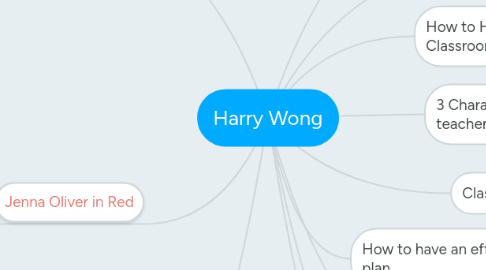
1. The Problem is Not Discipline
1.1. Three steps to teaching procedures
1.1.1. Teach. State, explain, model and demonstrate the procedure
1.1.2. Rehearse. Rehearse and practice the procedure under your supervision.
1.1.3. Reinforce. Reteach, rehearse, practice and reinforce the procedure until it becomes a student habit or routine
1.2. Effective Classrooms
1.2.1. Students are actively involved in meaningful work
1.2.2. The procedures govern what they do and they understand how the class functions
1.2.3. The teacher, who is also involved in work is moving around the room, helping, correcting, answering, disciplining, encouraging, smiling and caring
1.3. A procedure is simply a method or process for getting things done in the classroom
1.3.1. A procedure is what the teacher wants done
1.3.2. A routine is what the sudents do automatically
1.4. Discipline vs. Procedures
1.4.1. Discipline concerns how students behave
1.4.2. Procedures concern how things are done
2. Organized and Predictable
2.1. Consistency
2.2. Procedures produce permanent change
2.3. Some typical classroom prodecures should include:
2.3.1. Dividing into groups
2.3.2. The movement of paper
2.3.3. Transistion
2.3.4. Starting a class
2.4. Transition procedure
2.4.1. Close one task
2.4.2. Prepare for another task
2.4.3. Refocus on a new task
2.5. Code Red
2.5.1. There is no more important procedure than to have one for an emergency drill
2.6. Effective Grouping: The Class Climate and The Explanation
2.6.1. The Class Climate: It is important that all the determinants of successful student cooperation be in place before the class is divided into groups.
2.6.2. The Explanation: Students need to know the number of people in a group and the length of time in a group
2.7. Group Structure
2.7.1. Teach evaluation methods
2.7.2. Insist on individual accountability
2.7.3. Teach the procedures
2.7.4. State the purpose, materials and steps
2.7.5. Specify the group size
2.7.6. Specify the group name
3. Jenna Oliver in Red
4. How to Have a Well Managed Classroom
4.1. Key Terms
4.1.1. Consistency, Manage, Effective Teacher
5. 3 Characteristics of effective teachers
5.1. Good classroom management skills, they teach for lesson mastery, they practice positive expectations
6. Classroom management skills;
6.1. foster student achievement and cooperation in all classroom activities, as well as establish a productive working environment
7. Classroom Management definition
7.1. "Classroom management refers to all of the things a teacher does to organize students, space, time, and materials so learning can take place.
8. A well managed classroom has:
8.1. students are deeply involved in their work, little wasted time, students know what is expected of them, classroom climate is work oriented
9. How to have an effective discipline plan
9.1. Be a proactive teacher
9.2. Manage instead of discipline your classroom
10. 3 types of discipline plans
10.1. Teacher in charge
10.2. Student and teacher in charge
10.3. Student is in charge
11. Types of consequences
11.1. Positive consequences
11.1.1. Rewards
11.2. Negative consequences
11.2.1. Penalties
